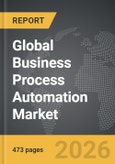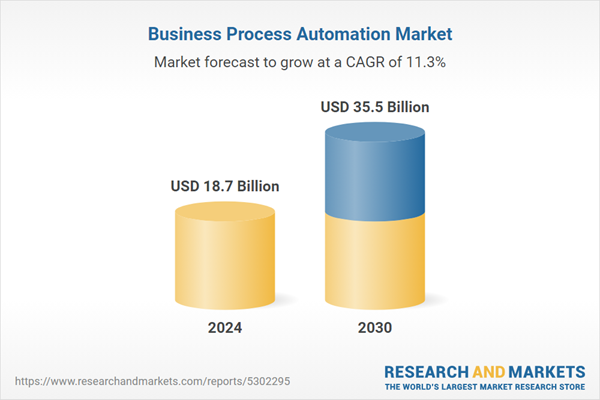Global Business Process Automation Market - Key Trends and Drivers Summarized
Why Is Business Process Automation Becoming a Cornerstone for Modern Enterprises?
Business Process Automation (BPA) has emerged as a vital strategy for companies looking to streamline operations, enhance productivity, and maintain a competitive edge in an increasingly digital marketplace. At its core, BPA involves the use of technology to automate repetitive, manual tasks, allowing organizations to optimize workflows, reduce human error, and focus employee efforts on more strategic activities. This automation can be applied across various business functions, including finance, human resources, customer service, and supply chain management. Traditional, manual processes, such as data entry, invoice processing, and employee onboarding, can be time-consuming and prone to errors, which can lead to inefficiencies, compliance risks, and increased operational costs. By leveraging BPA tools - such as Robotic Process Automation (RPA), artificial intelligence (AI), and workflow automation software - organizations can achieve greater accuracy, speed, and consistency in executing routine tasks. For instance, RPA bots can handle high-volume, rules-based operations like payroll processing and inventory management, freeing up human workers to concentrate on higher-value activities like decision-making and customer engagement. Furthermore, BPA not only streamlines existing processes but also enables better scalability, as automated systems can handle growing workloads without the need for proportional increases in workforce size.How Is Business Process Automation Evolving Beyond Routine Task Management?
While early iterations of Business Process Automation primarily focused on automating simple, repetitive tasks, the field has significantly evolved, driven by advancements in AI, machine learning (ML), and cognitive computing. Today, BPA solutions are capable of automating complex decision-making processes and performing sophisticated data analysis, marking a shift from mere task automation to intelligent process automation (IPA). This new generation of automation tools can analyze unstructured data, interact with customers through chatbots, and even predict outcomes based on historical data patterns. For instance, AI-powered BPA platforms are being used to automate customer service interactions, where they not only provide instant responses to queries but also escalate issues to human agents when necessary, ensuring a seamless customer experience. Similarly, in finance, intelligent automation can review expense reports, flag discrepancies, and initiate corrective actions without human intervention. This evolution is transforming BPA from a back-office tool into a strategic asset that influences core business decisions. Furthermore, the integration of natural language processing (NLP) and sentiment analysis is enabling automation tools to understand and respond to complex human communication, expanding their utility in areas like employee management and customer relations.What Are the Key Regulatory and Security Considerations for Business Process Automation?
The rapid adoption of Business Process Automation has raised important regulatory and security considerations that organizations must address to safeguard sensitive data and ensure compliance with industry standards. Automation systems, particularly those powered by AI and machine learning, often handle large volumes of sensitive information, ranging from financial data to customer records and employee details. This data can become a potential target for cyberattacks if not properly secured. Consequently, companies must implement robust cybersecurity measures, such as data encryption, multi-factor authentication, and regular vulnerability assessments, to protect their automated systems. Additionally, compliance with data privacy regulations like the General Data Protection Regulation (GDPR) in Europe and the California Consumer Privacy Act (CCPA) in the United States is paramount. These regulations impose strict requirements on how personal data is collected, processed, and stored, making it critical for BPA solutions to incorporate features that ensure data handling is transparent and secure. Another regulatory concern is maintaining auditability and traceability in automated workflows. Many industries, such as finance and healthcare, require companies to maintain detailed records of all automated processes to ensure accountability and compliance with regulatory standards. As a result, BPA vendors are increasingly embedding audit trails, user access controls, and compliance reporting capabilities into their platforms. Furthermore, organizations must navigate ethical considerations around the use of AI in decision-making processes, ensuring that automation does not lead to biased outcomes or unintended consequences.What Are the Key Drivers Behind the Growth of the Business Process Automation Market?
The growth in the Business Process Automation market is driven by several key factors that reflect both technological advancements and shifting business priorities. One of the primary drivers is the increasing pressure on companies to improve operational efficiency and reduce costs amidst intensifying global competition. BPA enables organizations to achieve significant cost savings by reducing reliance on manual labor for routine processes, minimizing errors, and accelerating turnaround times. Another critical driver is the rise of digital transformation initiatives, where BPA serves as a foundational component, enabling companies to modernize legacy systems and optimize end-to-end workflows. The integration of AI and machine learning into BPA tools is further expanding the scope and sophistication of automation, allowing businesses to automate not only repetitive tasks but also more complex processes that involve decision-making and predictive analytics. Additionally, the growing adoption of cloud-based BPA solutions is making automation more accessible to small and medium-sized enterprises (SMEs), which previously lacked the resources to invest in large-scale automation platforms. This democratization of automation technology is creating new growth opportunities in untapped markets. Consumer expectations are also influencing the adoption of BPA, as companies seek to deliver faster, more consistent, and personalized experiences. For example, automated chatbots and virtual assistants are being widely deployed to enhance customer support services, enabling companies to provide 24/7 service without additional staffing costs. Moreover, the increasing focus on compliance and risk management is driving demand for BPA solutions that can standardize processes, ensure regulatory compliance, and generate comprehensive audit trails. Together, these factors are fueling rapid growth in the Business Process Automation market, making it one of the most dynamic and strategically important segments within the broader enterprise technology landscape.Report Scope
The report analyzes the Business Process Automation market, presented in terms of market value (US$ Thousand). The analysis covers the key segments and geographic regions outlined below.- Segments: Deployment Type (On-Premises, Cloud); Business Function (HR Automation, Supply Chain, Sales & Marketing, Customer Service Support, Accounting & Finance, Other Business Functions); Vertical (BFSI, IT, Telecommunications, Retail & Consumer Goods, Manufacturing, Healthcare, Other Verticals).
- Geographic Regions/Countries:World; United States; Canada; Japan; China; Europe (France; Germany; Italy; United Kingdom; Spain; Russia; and Rest of Europe); Asia-Pacific (Australia; India; South Korea; and Rest of Asia-Pacific); Latin America (Argentina; Brazil; Mexico; and Rest of Latin America); Middle East (Iran; Israel; Saudi Arabia; United Arab Emirates; and Rest of Middle East); and Africa.
Key Insights:
- Market Growth: Understand the significant growth trajectory of the On-Premises Deployment segment, which is expected to reach US$16.9 Billion by 2030 with a CAGR of a 9.2%. The Cloud Deployment segment is also set to grow at 13.4% CAGR over the analysis period.
- Regional Analysis: Gain insights into the U.S. market, valued at $4.8 Billion in 2024, and China, forecasted to grow at an impressive 14.7% CAGR to reach $8.2 Billion by 2030. Discover growth trends in other key regions, including Japan, Canada, Germany, and the Asia-Pacific.
Why You Should Buy This Report:
- Detailed Market Analysis: Access a thorough analysis of the Global Business Process Automation Market, covering all major geographic regions and market segments.
- Competitive Insights: Get an overview of the competitive landscape, including the market presence of major players across different geographies.
- Future Trends and Drivers: Understand the key trends and drivers shaping the future of the Global Business Process Automation Market.
- Actionable Insights: Benefit from actionable insights that can help you identify new revenue opportunities and make strategic business decisions.
Key Questions Answered:
- How is the Global Business Process Automation Market expected to evolve by 2030?
- What are the main drivers and restraints affecting the market?
- Which market segments will grow the most over the forecast period?
- How will market shares for different regions and segments change by 2030?
- Who are the leading players in the market, and what are their prospects?
Report Features:
- Comprehensive Market Data: Independent analysis of annual sales and market forecasts in US$ Million from 2024 to 2030.
- In-Depth Regional Analysis: Detailed insights into key markets, including the U.S., China, Japan, Canada, Europe, Asia-Pacific, Latin America, Middle East, and Africa.
- Company Profiles: Coverage of players such as ABB, IBM Corporation, Infosys Limited, Polycom, Rockwell Automation and more.
- Complimentary Updates: Receive free report updates for one year to keep you informed of the latest market developments.
Some of the 122 companies featured in this Business Process Automation market report include:
- ABB
- IBM Corporation
- Infosys Limited
- Polycom
- Rockwell Automation
- SAP SE
- Schneider Electric
- Siemens
- Tata Consultancy Services Limited
- Yokogawa
This edition integrates the latest global trade and economic shifts into comprehensive market analysis. Key updates include:
- Tariff and Trade Impact: Insights into global tariff negotiations across 180+ countries, with analysis of supply chain turbulence, sourcing disruptions, and geographic realignment. Special focus on 2025 as a pivotal year for trade tensions, including updated perspectives on the Trump-era tariffs.
- Adjusted Forecasts and Analytics: Revised global and regional market forecasts through 2030, incorporating tariff effects, economic uncertainty, and structural changes in globalization. Includes historical analysis from 2015 to 2023.
- Strategic Market Dynamics: Evaluation of revised market prospects, regional outlooks, and key economic indicators such as population and urbanization trends.
- Innovation & Technology Trends: Latest developments in product and process innovation, emerging technologies, and key industry drivers shaping the competitive landscape.
- Competitive Intelligence: Updated global market share estimates for 2025, competitive positioning of major players (Strong/Active/Niche/Trivial), and refined focus on leading global brands and core players.
- Expert Insight & Commentary: Strategic analysis from economists, trade experts, and domain specialists to contextualize market shifts and identify emerging opportunities.
Table of Contents
Companies Mentioned (Partial List)
A selection of companies mentioned in this report includes, but is not limited to:
- ABB
- IBM Corporation
- Infosys Limited
- Polycom
- Rockwell Automation
- SAP SE
- Schneider Electric
- Siemens
- Tata Consultancy Services Limited
- Yokogawa
Table Information
| Report Attribute | Details |
|---|---|
| No. of Pages | 473 |
| Published | January 2026 |
| Forecast Period | 2024 - 2030 |
| Estimated Market Value ( USD | $ 18.7 Billion |
| Forecasted Market Value ( USD | $ 35.5 Billion |
| Compound Annual Growth Rate | 11.3% |
| Regions Covered | Global |









